One of my favorite Miyazaki films is Spirited Away. I’ve just learned there is a Wikia page anyone can edit about the film. I couldn’t resist rewriting a bit of 湯 婆 婆 (Yubaba)’s page.
-
Recent Posts
Archives
Categories
One of my favorite Miyazaki films is Spirited Away. I’ve just learned there is a Wikia page anyone can edit about the film. I couldn’t resist rewriting a bit of 湯 婆 婆 (Yubaba)’s page.
Chihiro must find a job to save her parents, who were a bit too hungry at the beginning of the film!
The film is divided into parts here, with accurate scripts for each 10-minute segment.
Ready? Let’s cook. ![]()
French and English both have particles that change the meanings of verbs. By far the most common in French is the prefix re- in verbs like rentrer (come / go/ get back), remplacer (replace, fill in for), remplir (fill in/out), but other prefixes like en- or em-, sur-, trans- / tra- are also common (emporter, enlever, surpasser, traverser).
In English, however, the particles remain independent words. Often they represent a more fundamental relationship between the subject and predicate : e.g. Game over. Time’s up. You’re out.
In English, prepositions and particles do some of the work that verbs do in French:
| go across (a bridge) | traverser (un pont) | swim across | traverser en nageant |
| go over (a bridge) | traverser (un pont) | swim over | (approcher / traverser) en nageant |
| go through (a tunnel) | traverser (un tunnel) | swim through | passer à travers à la nage |
(où le préfix trans- (à travers) fait partie du verbe)
While across and through are fairly straightfoward, over is more complicated: sometimes translated with re- (do it over), sometimes with sur- ou sup-: overestimate (surestimer), overtime (heures suppleméntaires), sometimes with au-dessus or au-delà de
This song just would not have the same force if it were “somewhere above the rainbow”, which feels like just one point, not all the space beyond the rainbow… In fact, over implies anywhere “beyond” or “on the other side of” the said rainbow. So something that is “over” may well in fact be close by: a deadline is looming over us… “there’s a shadow hanging over me” (The Beatles, “Yesterday”), at any moment “the game” may be over.
When combined with a dynamic light verb like “get”, which emphasizes difficulty or resistance, the result is more metaphorical: get over it means recover from something with relative difficulty (se remettre de qqch).
A complete overlap of territory can be seen in “take over”:
idem perhaps with make-over.
On the other hand, when you go over (parcourir) or look over (parcourir) or even run over (STH: rehearse (répéter), dépasser le temps alloué, écraser par accident en conduisant), it can mean simply to “go through” from beginning to end, but the idea may also be to skim over (lire en diagonale). The verb and the context give clues as to what degree of attention was paid to the object during the parcours.
There is a more thorough treatment of over on the wiki (including its use as a situative). Unlike through and across — it is one of the 100 most common words (#78) in English.
There are three basic meanings for out:
I realized I had run out of tea, so I got in the car and went to get some.
I ran out of gas on the motorway, and when I got out of the car, the tea was forgotten.
A policeman stopped. I had to fill out a form, before leaving my car out on the shoulder of the highway.
That’s one out-of-luck tea-drinker! Out and gone can be virtual synonyms, though out makes one think more of the Great Outdoors: out fishin’ / gone fishin’.
Buy SO / STH out. Imagine you decide you like They Might Be Giants (“Particle Man”, above), and you buy all the CDs at the local CD shop. You buy the store out of They Might Be Giants CDs. The store has none left. Similarly, when you buy someone out, they no longer have a controlling voice in the direction of the entity (business, etc.) you’ve just bought them out of.
For LBO (leveraged buyouts), you can look at Wikipedia, if interested, again. Or you might like to read about Warren Buffet’s LBO of Heinz ( 14 fév 2013) )
Some interesting verb-particle combinations:
Next time, we’ll look at up/down and on/off. You can find further information on the 100 most common words in English on the wiki: §. The latest addition (16 Feb 2013) is “what”, but it’s not finished ![]()
or until next time. ![]()
Here spring is just peaking out, and yet I find myself looking at images of summers past. I thought I would share, in hopes you’ll forgive me for being a bit out of season!
What better way to test audio file format compatibility than to record a bit of Rubaiyat? (see farther down for Shelley’s “Ozymandias”)
Rubaiyat of Omar Khayyam, Edward Fitzgerald
quatrain 1-13

Rubaiyat of Omar Khayyam, Ronald Balfour 1920
1
Wake! For the Sun, who scatter’d into flight
The Stars before him from the Field of Night,
Drives Night along with them from Heav’n, and strikes
The Sultán’s Turret with a Shaft of Light.
2
Before the phantom of False morning died,
Methought a Voice within the Tavern cried,
“When all the Temple is prepared within,
“Why nods the drowsy Worshipper outside?”
3
And, as the Cock crew, those who stood before
The Tavern shouted–”Open then the Door!
“You know how little while we have to stay,
“And, once departed, may return no more.”
4
Now the New Year reviving old Desires.
The thoughtful Soul to Solitude retires,
Where the White Hand Of Moses on the Bough
Puts out, and Jesus from the Ground suspires.
5
Iram indeed is gone with all his Rose,
And Jamshýd’s Sev’n-ring’d Cup where no one knows;
But still a Ruby gushes from the Vine,
And many a Garden by the Water blows.
6
And David’s lips are lockt; but in divine
High-piping Péhlevi, with “Wine! Wine! Wine!”
Red Wine!”–the Nightingale cries to the Rose
That sallow cheek of hers to incarnadine.
7
Come, fill the Cup, and in the fire of Spring
Your Winter-garment of Repentance fling:
The Bird of Time has but a little way
To flutter–and the Bird is on the Wing.
8
Whether at Naishápúr or Babylon,
Whether the Cup with sweet or bitter run,
The Wine of Life keeps oozing drop by drop,
The Leaves of Life keep falling one by one.
9
Each Morn a thousand Roses brings, you say:
Yes, but where leaves the Rose of Yesterday?
And this first Summer month that brings the Rose
Shall take Jamshyd and Kaikobád away.
10
Well, let it take them! What have we to do
With Kaikobád the Great, or Kaikhosrú?
Let Zál and Rustum bluster as they will,
Or Hátim call to Supper–heed not you.
11
With me along the strip of Herbage strown
That just divides the desert from the sown,
Where name of Slave and Sultán is forgot –
And Peace to Máhmúd on his golden Throne!
12
A Book of Verses underneath the Bough,
A Jug of Wine, a Loaf of Bread—and Thou
Beside me singing in the Wilderness–
Oh, Wilderness were Paradise enow!
13
Some for the Glories of This World; and some
Sigh for the Prophet’s Paradise to come;
Ah, take the Cash, and let the Credit go,
Nor heed the rumble of a distant Drum!
Ozymandias
I met a traveller from an antique land
Who said: — Two vast and trunkless legs of stone
Stand in the desert. Near them on the sand,
Half sunk, a shatter’d visage lies, whose frown
And wrinkled lip and sneer of cold command
Tell that its sculptor well those passions read
Which yet survive, stamp’d on these lifeless things,
The hand that mock’d them and the heart that fed.
And on the pedestal these words appear:
“My name is Ozymandias, king of kings:
Look on my works, ye mighty, and despair!”
Nothing beside remains: round the decay
Of that colossal wreck, boundless and bare,
The lone and level sands stretch far away.

The symbols of the planets, the signs of the Zodiac, knights, quarter notes, right triangles and baseball diamonds: they’re all (praise be) in Unicode: 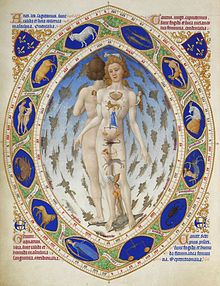 (categorized symbol worksheet). A fan of Slavic languages, I found a nice list of the character codes on the Знаки зодиака (signs of the Zodiac) wikipedia page (the picture links to the article).
(categorized symbol worksheet). A fan of Slavic languages, I found a nice list of the character codes on the Знаки зодиака (signs of the Zodiac) wikipedia page (the picture links to the article).
It’s fun working on “math” in class: Is 3² greater than two cubed? Yeah? and the cube root of 64? Chant: Gemini. pi. 3.14159
But the kids prefer talking about baseball diamonds and rings around Saturn. The energy level when I stepped up to bat in a recent class makes me wonder if it wouldn’t be a good idea to have some of the kids do a baseball sketch (pitcher, batter, (catcher), commentator, umpire). strike/struck/stricken; in / out; nine “in”nings; home and away, top of the third…
Really the document above isn’t anything more than a silly collection of Unicode symbols (best printed 2 in 1, if you still have to print / copy / cut and have students paste in their notebooks). But it can lead you in very unexpected directions: like fixing up pronunciations of Mighty Aphrodite and Jumping Jupiter.
Here’s a planet/Greek god page on my wiki notebook, with wordstress marked and links to cool facts… in class I focused on spatial prepositions (between, near, nearest, far, farthest), and the “equivalencies” between Greek and Roman gods (and what they were god(ess -e -s) of). So far, in each group, there are several kids who remember a little mythology from 6e.
I still owe you a zither, but have some blueberry pi while you’re waiting…
or read some bull (mythology)
One of my favorite albums / CDs is Louis Armstrong’s Louis and the Good Book There’s just something about the way he renders these old songs that is very compelling to me.
 I’ve worked most lately on “Jonah and the Whale” and have worked up a gap-fill along with some visual symbols associated with the different prepositions/particles/quantifiers/adverbs that drive the song — as well as much of the music on the CD.
I’ve worked most lately on “Jonah and the Whale” and have worked up a gap-fill along with some visual symbols associated with the different prepositions/particles/quantifiers/adverbs that drive the song — as well as much of the music on the CD.
and the story…
Lyrics
 Jonah was a man got a word _ _ _ _ the Lord
Jonah was a man got a word _ _ _ _ the Lord
“Go and preach the Gospel _ _ the sinful land”
But he got _ _ a ship and he tried to get _ _ _ _
And he ran _ _ _ _ a storm _ _ the middle _ _ the sea
Now the Lord, He made the waves just a-roll _ _ high
The ship begin _ _ sink and they _ _ _ begin _ _ cry
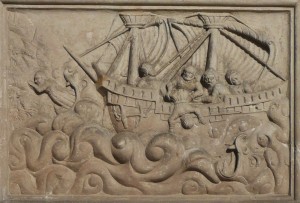
So they pulled old Jonah
_ _ _ of the hole
And they jumped him _ _ the water
just to lighten _ _ the load
 Now the Lord made a whale, long and wide
Now the Lord made a whale, long and wide
Lord, Lord, wadn’at a fish !
And he swallowed ____ Jonah, hair and hide
Lord, Lord, wadn’at a fish !
Mmm, Lord, mmm, Lord
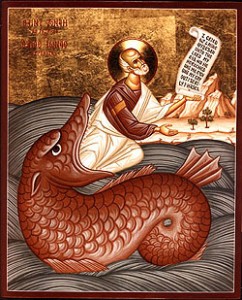 Now Jonah started to pray _ _ the belly _ _ the whale
Now Jonah started to pray _ _ the belly _ _ the whale
Lord, Lord, wadn’at a fish !
He repented _ _ his sins _ _ _ _ a man _ _ jail
Lord, Lord, wadn’at a fish !
Mmm, Lord, mmm, Lord
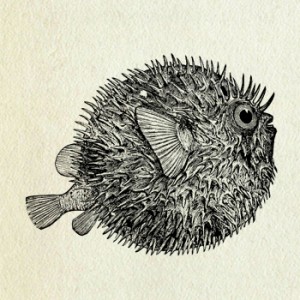 Now Jonah must’ve been a bad man,
Now Jonah must’ve been a bad man,
he must’ve been a sinner
Lord, Lord, wadn’at a fish !
Coz’ _ _ _ _ the whale got him _ _ _ _,
he didn’t like his dinner
Lord, Lord, wadn’at a fish !
Mmm, Lord, mmm, Lord
Well he swung _ _ _ _ _ _ the ocean,
sick _ _ he could be
Lord, Lord, wasn’t that a fish !
And _ _ _ _ _ three days, whoops!
he had _ _ set him free
Lord, Lord, wasn’t that a fish ! mmm
So the whale spit Jonah _ _ _
_ _ the dry land
Lord, Lord, wadn’at a fish !
And he went _ _ _ _ preaching
_ _ _ _ a righteous man
Lord, Lord, wadn’at a fish !
Then the people quit their sins
when they heard him _ _ the town
Lord, Lord, wadn’at a fish !
So when you hear the call,
don’t you turn the Gospel _ _ _ _
Lord, Lord, wadn’at a fish, hmmm?
another Louis Armstrong classic from the same album:
A fun version of the negro spiritual “Go Down, Moses” that has been redone with plenty of humor as “Отпусти народ мой!” (Out-let people my) (in English, while ironing and smoking a big cigar…)
From 3:40 of the video above you can listen to straight Louis Armstrong.
The lyrics are quite simple if you wish to follow along:
Chorus: Go down Moses
Way down in _ _ _ _ _ land
Tell all pharaohs to
Let my people go!
Armstrong:
When Israel _ _ _ in Egypt land…
Let my people go!
Oppressed so hard they _ _ _ _ _ not stand…
Let my people go!
So the Lord said: _ _ down, Moses
Way down _ _ Egypt land
Tell all pharaohs to
_ _ _ my people go!
So Moses went _ _ Egypt land…
Let my people go!
He made all pharaohs _ _ _ _ _ _ _ _ _ _
Let my people go!
Yes the Lord said go _ _ _ _, Moses
Way down in Egypt _ _ _ _
Tell _ _ _ pharaohs to
Let my people go!
Thus _ _ _ _ the Lord, bold Moses _ _ _ _:
Let my people go!
if _ _ _ I’ll smite, your first-born _ _ _ _
_ _ _ my people go!
And the lord said go down, Moses
_ _ _ down in Egypt land
_ _ _ _ all pharaohs to
Let my _ _ _ _ _ _ go!
Tell all pharaohs to
Let my people go!
another version by Paul Robeson.
OR
(Carole King’s lyrics are slightly different)
When you’re _ _ _ _ and troubled and you need a _ _ _ _ _ _ hand
and nothing, whoa, nothing is going _ _ _ _.
Close your _ _ _ _ and think of me
and soon I _ _ _ _ be there
to brighten _ _ even your darkest nights.
You just call _ _ _ my name,
and you know wherever I _ _
I’ll come running _ _ _ _ _ you again.
_ _ _ _ _ _, spring, summer, or fall
all you _ _ _ _ _ _ do is call and I’ll be there, yeah, yeah,
you’ve _ _ _ a friend.
If the sky _ _ _ _ _ you should turn dark and _ _ _ _ _ _ clouds
and that old north wind should _ _ _ _ _ _ _ blow,
_ _ _ _ your head together
and call my name _ _ _ loud.
_ _ _ _ I will be knocking upon your door.
You _ _ _ _ call out my name, and you know _ _ _ _ _ _ _ _ I am
I’ll come _ _ _ _ _ _ _ to see you again.
Winter, spring, _ _ _ _ _ _ , or fall,
all you’_ _ _ _ _ _ _ do is call and I’ll be there.
Hey, ain’t it _ _ _ _ _ _ know that you’ve got a friend?
People can be _ _ cold.
They’ll hurt you _ _ _ desert you.
Well, they’ll take your soul if you _ _ _ them,
oh yeah, but _ _n’t you let them.
You just _ _ _ _ out my name,
_ _ _ you know where ever I am
I’ll come running _ _ _ _ _ you again.
Winter, spring, summer, or _ _ _ _ ,
all you have to do is call, Lord, I’ll be _ _ _ _ _, yeah, yeah,
you’ve got _ friend.
You’ve _ _ _ a friend.
Ain’t it good to _ _ _ _ you’ve got a friend.
Ain’t it good to _ _ _ _ you’ve got a friend.
Oh, yeah, yeah, you’ve got a friend.
Another version at lyrics training
(Céline Dion, Carole King, Gloria Estefan, Shania Twain)
The ALA Book and Media awards were announced last Monday, and you can see the full list of awards on the ALSC. (link) One book that caught my attention was a Pura Belpré author honor award given to Hurricane Dancers: The First Caribbean Pirate Shipwreck by Margarita Engle, published by Henry Holt and Company, LLC. The prize is named after the first Latina librarian at the New York Public library.

The blurb from the awards page is very appealing:
Engle’s beautifully written poetic narrative cuts to the heart of an untold story in Latin American history and describes the enslavement of the native peoples of the Caribbean by the Spanish along with the mixing of Spanish and native blood that now forms the vast majority of Latin America. Told from several points of view, the story captures the rhythm and sounds from a time long ago and encourages readers to explore Latino culture on their own.
I’ve only used four or five books in the classroom, more in the spirit of “cric crac” than “lecture suivie”. You might find a couple of them fun to do with your students…
For teaching modals, I recommend Green Eggs and Ham. They go so well with boiled yams.
You’d best not throw them down the drain! the fox will stop your bullet train!

-source: http://www.childrensclassics.com.au/
And if you want to teach your students sentences like “I’ll be careful. I’ll give you five bucks. I’ll bet your mother would let me.” “LET ME DRIVE THE BUS!” and the responses… “No you won’t / I don’t care / No, she wouldn’t. / No way, you’re a pigeon!”, I wholeheartedly recommend:
Enjoy the video (the book being read by a (native) two-year old). ^_^
These days, Mo Willem’s Pigeon Presents now offers the Don’t Let the Pigeon Run this App (erm) app… at, where else? :sigh:, the app store
Speaking of apps, the ALA page also has a lot of links to the great websites for kids they find.
__________________
There are some more kids book references on my lingo wiki.
One of my teaching experiments to pass on a bit of culture and geography this year was to work with the American State Quarters. The primary language goals were to get students to learn their numbers from 0-99, to learn the verb “become” in the past tense, to describe the coins using the existential structure (there is / there are).
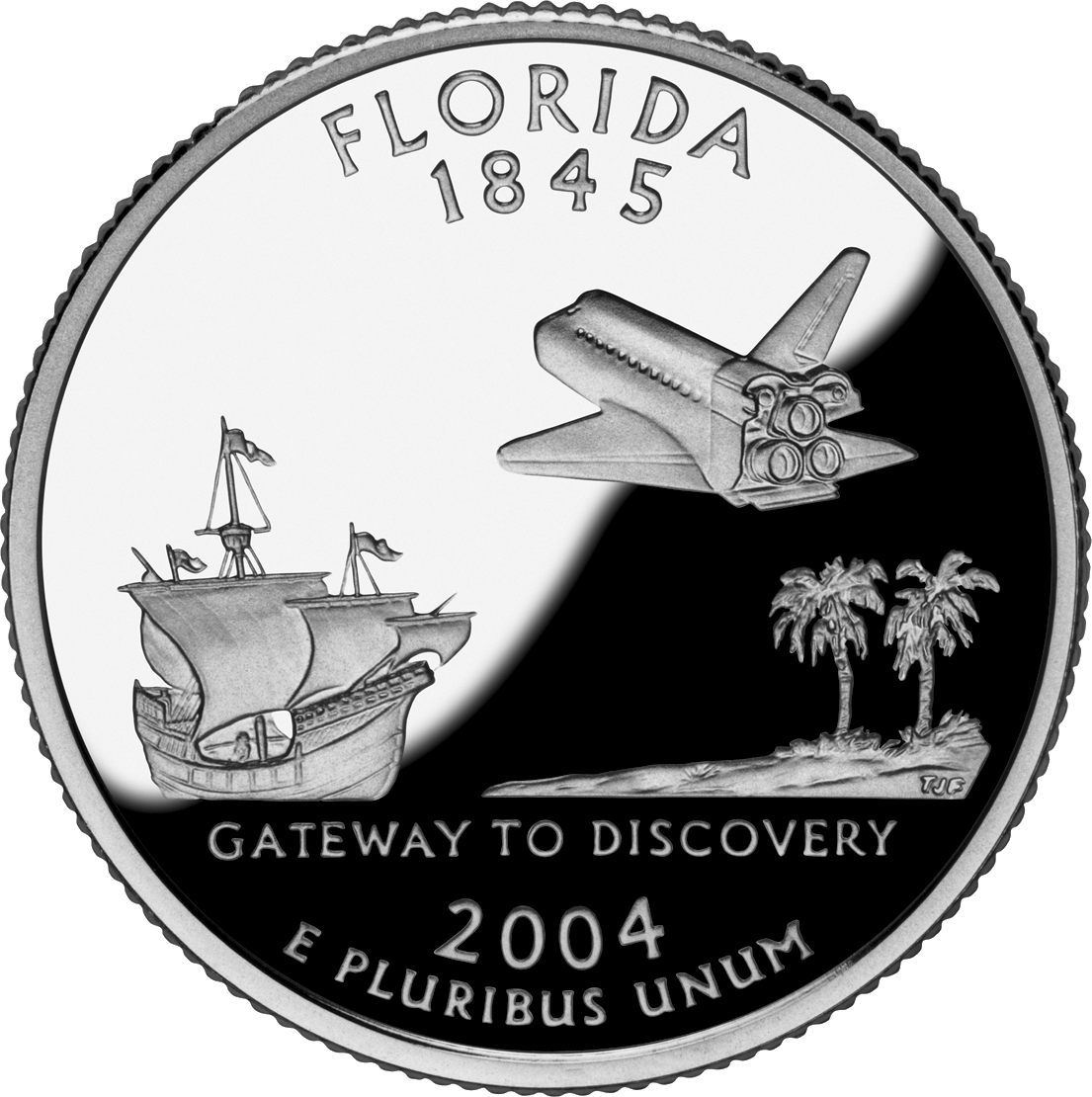
So I downloaded the images from Wikimedia commons, had a look at the program at the 50 State Quarters program at the US mint, and got to work making a printable webpage of the 50 quarters all on one page. (You may have to fiddle around with sizing when printing, depending on your navigator.) Along with this I put together a quick webquest starting from this page, where I ask the kids to find information on the state of their choosing, things like naming or describing the state bird, motto, flower, and flag, finding the biggest cities in each state and the capital. This works pretty well for a single hour in the computer lab.
Since it seems to me that especially in the lower levels of middle school (6e-4e), students often still need reassurance and practice with numbers, money and fractions are particularly useful subjects. This document (originally made for 6e) summarizes the different denominations of coins, and asks students to practice with the dates of the major presidents (Jefferson was born in ______ and he died in _______ ).
In coordination with a map showing the different regions, it can be used to teach the cardinal directions and comparisons… (“farther north/west than”) as well as basic spatial prepositions like “next to”, “north of”, “in the __________ region”
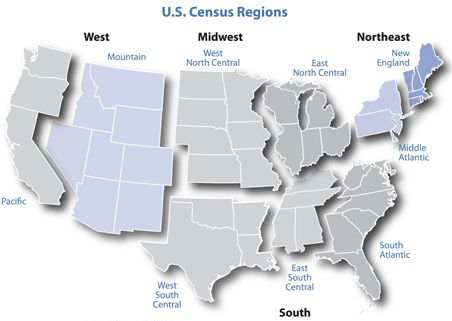
The subject of pocket change can also be used in conjunction with symbols. For example, this year I put together a short document on symbols of liberty after discussing the subject with the History / Geography teacher at one of my schools. It was a pleasure digging up Liberty dimes and Franklin quarters, though the classroom activity still needs a good bit of work!
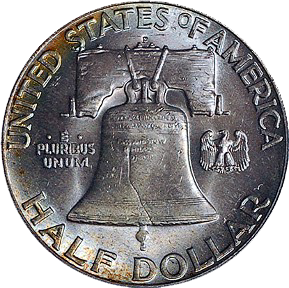
To come back to the state quarters, I find the Alabama quarter particularly interesting because it allows one to review many of the above concepts, but also to note that not all languages are spoken, which leads to thinking about other artificial languages like, say PERL or HTML.

Here’s a one page exercise that should take around 20-25 minutes to complete in an exam-taking situation, that helps them along with dates, ordinals, numbers, along with some (often very) guiding questions. This is a remediation page, arguably more appropriate for 6e, but the spirit of this page is useful in pulling the stragglers along.
And I think the state quarter helps explain Ron Paul’s strong showing in the New Hampshire primary.
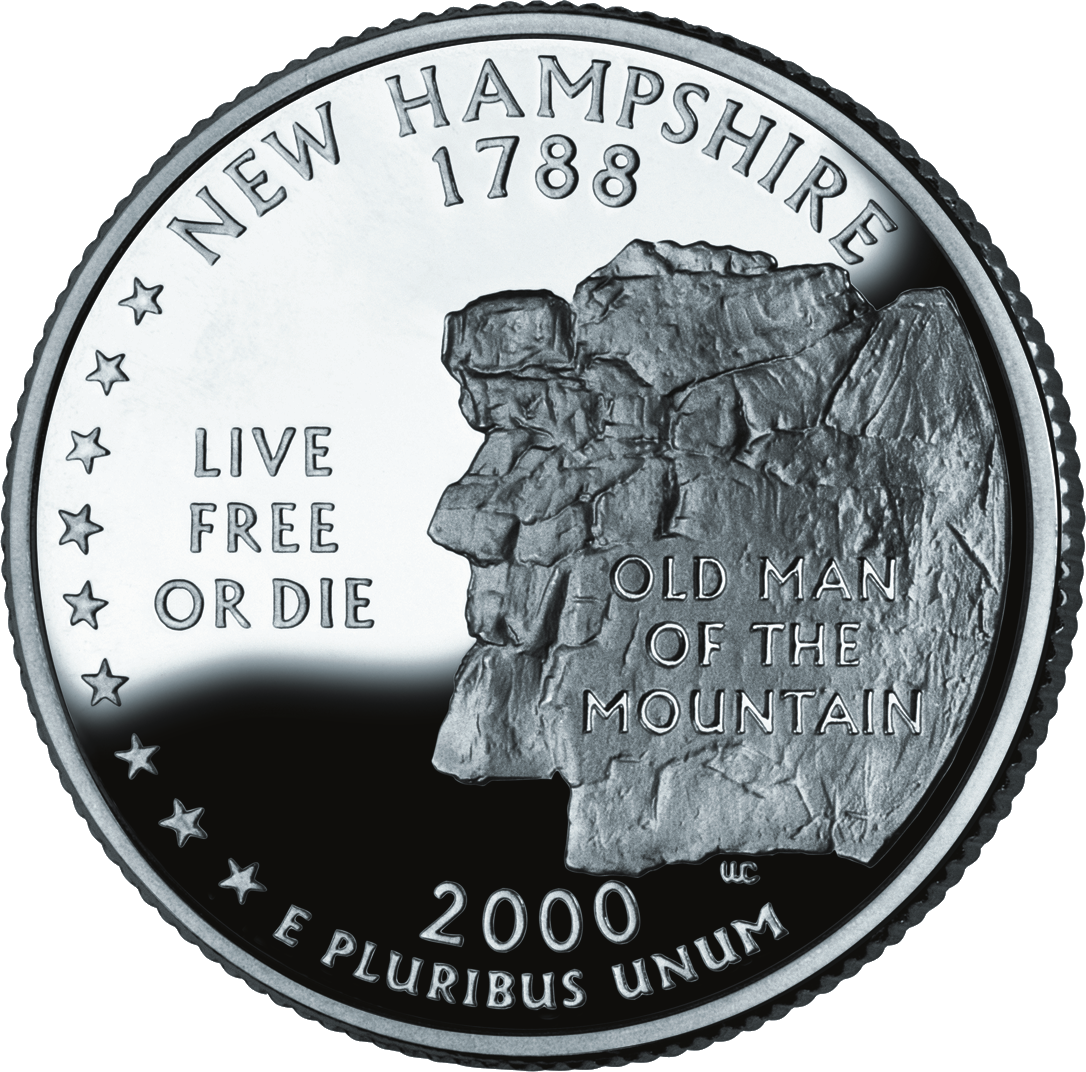
Though I wouldn’t be surprised if he also did well in my home state:

In any case, after having cut hundreds of these little coins out for use in envelopes in class, and pasting them in student notebooks as bonuses (along with the State Territories and America the Beautiful Quarters), I’m looking forward to attending Marie Rivoire’s “Ilôts Bonifiées” seminar in Villeurbanne in March!